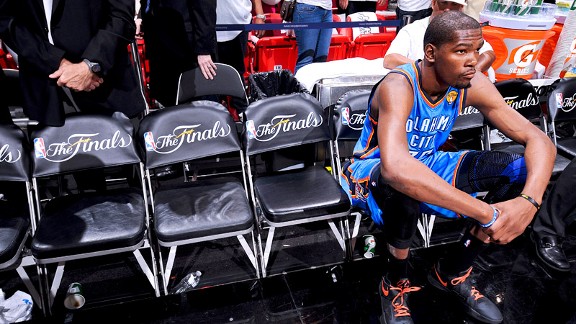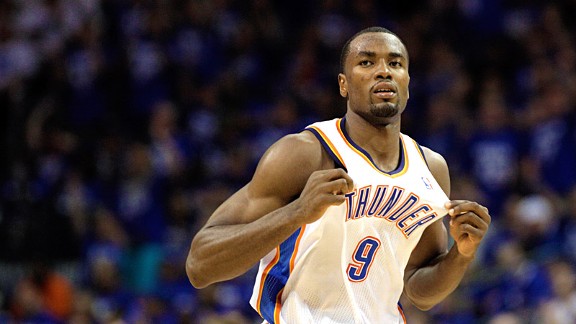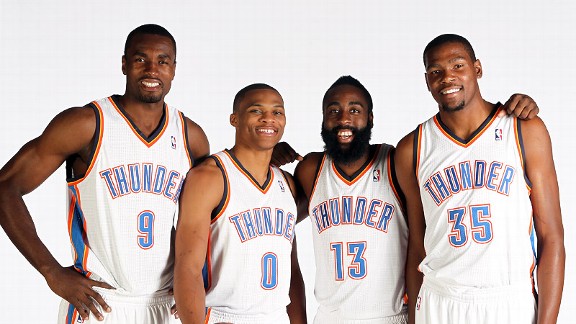Vs: Oklahoma City Thunder - viimeinen askel on vaikein askel
John Hollingerin kausiennakossa (ESPN Insider) nousee esille ihan mielenkiintoisia asioita:
- OKC:n hyökkäys oli viime kaudella liigan toiseksi tehokkain, vaikka pelitilanneheittoja ja koriinjohtavia syöttöjä tuli hyvin vähän ja menetyksiä paljon.
- Nuoria joukkueita on yleensä pidetty hyvinä runkosarjajoukkueina, mutta OKC:n materiaali sopii paremmin pudotuspelipalloon.
- OKC:n roolipelaajastrategia on juuri päinvastainen kuin Miamilla: ikääntyneiden veteraanien sijaan investoidaan "low risk, high reward" tyyppisiin lupauksiin.
[quote author=John Hollinger]
Overview
So now that the inevitable has happened and the Thunder are the reigning Western Conference champions, it's time to move on to a different question: Can they keep the band together?
As the ultimate small-market team trying to do everything right to build and maintain a winner, the Thunder in some ways represent the first teal test for the league's collective bargaining agreement. So far they've checked every box, but now comes the really hard part. They've already maxed out Kevin Durant and Russell Westbrook, and paid a rich extension to Serge Ibaka. But now the question becomes, How do they keep James Harden?
The real dilemma is a year down the road, when Harden hits restricted free agency, but it's by far the biggest obstacle facing the Thunder as a franchise. Harden is almost certainly a max player; if the Thunder don't give it to him, somebody else will. (Reference point: Eric Gordon and Roy Hibbert got max offer sheets this past summer.)
Here's the problem: A max deal for Harden will give the Thunder something in the neighborhood of an $85 million payroll a year from now, when the league's more draconian luxury tax penalties kick in. Which would result in Oklahoma City cutting a check in the $25 million range to the league, depending on where next season's luxury tax level comes in (it's now at just over $70 million). That's mostly because three other players they drafted, Durant, Westbrook and Ibaka, also make in excess of $12 million a season, but also because of one mistake -- a dubious, expensive extension for center Kendrick Perkins.
There are alternatives available, perhaps. They can use their amnesty clause to waive Perkins, get down closer to $75 million in payroll, and bypass most of the tax payments. Of course, they'd still be paying Perkins $10 million to not play for them, so the roster still would be very expensive. They can trade Harden or one of their other expensive players, although they're certain to get 50 cents a dollar in return. Or they can suck it up and pay through the nose for a year or two in a quest for a title.
The new CBA had two other unpleasant surprises for the Thunder. The first -- the "Rose rule" on extensions that gives bigger ones to superstar players -- helped put them in this mess. The value of Durant's extension rose by about $4 million per season because of this rule, which puts the Thunder $4 million deeper into the tax if they extend Harden. (It also put them just over the cap last summer, preventing them from bidding on the likes of Chauncey Billups in amnesty auctions.)
Wait, there's more: The new CBA incentivizes star players to become unrestricted free agents rather than sign extensions. It used to be that the Oklahoma Citys of the world had a nice weapon at their disposal to hang on to their stars -- just keep extending them a year before the contract expired, and they'd never become free agents.
But in an unintended consequence of owners' anger over the Carmelo Anthony saga and several similar events, the new CBA only allows a short extension, which means it's no longer worth it for players to extend when they can get a long-term deal a year later.
You know who that hurts? Not L.A. and New York, that's who. Just think: Durant will be a completely unrestricted free agent in 2016, and there's nothing the Thunder can do other than hope he wants to stay. Ditto for Westbrook and Serge Ibaka in 2017. Yes, that's far down the road, but it's coming.
In the meantime, they obviously have a heck of a team, and regardless of the Harden situation they should challenge for the championship this season. But the Thunder did everything right -- hitting home runs on four straight draft picks, avoiding bad contracts and patiently building a winner. If even they can't keep a good team together in a small market, it doesn't say great things about the CBA's alleged ability to let small markets compete for championships.
2011-12 Recap
The Thunder claimed their first West title, but they couldn't withstand the Heat in the NBA Finals.
The Thunder violated every conventional notion of what a great offense should look like, and had a great offense anyway. They didn't have a pure point guard; in fact their point guard shot a lot and not particularly accurately. They had the league's lowest assist rate and nearly led the NBA in turnovers. They were last in pure point rating, and second to last in shot attempts per possession -- even the Bobcats outdid them here.
But once they got a shot away, holy hell were they good. The Thunder were second in 2-point shooting, first in foul shooting and 11th in 3-point shooting. They had the league's highest free throw rate, accentuating their skill at the line, and as a result led the league in both secondary percentage and true shooting percentage.
So despite the lack of flowing passing and the rampant turnovers they were second in the NBA in offensive efficiency, propelled almost entirely by the efforts of three players. Harden had a TS% of 66.0 and Durant 61.0%, supplying ridiculous efficiency for such high-volume players. Westbrook chimed in with more normal efficiency (a league-average 53.8 TS%) but at an insanely high volume, a framework that has earned him considerable criticism but worked splendidly in concert with the other two last season.
This was not always the most attractive offense to watch, but again it was extremely effective, and was so despite the fact that several secondary players were pretty much inert.
Defensively, the Thunder were an interesting team as well, giving up a lot of points in the paint but also posting by far the league's highest shot-block rate, rejecting 9.58 percent of opponent offerings. Obviously Ibaka was the biggest factor here, but Durant also had an unusually high block rate for a wing player and several others contributed -- even without Ibaka, the Thunder out-blocked six other teams.
As a result, the Thunder were third in field goal defense and fourth in 2-point field goal defense. They were only ninth in efficiency, however, because of the same weakness that plagued them on offense: shots. The Thunder were poor at forcing turnovers and below average on the defensive glass, and as a result only the Lakers gave up more opponent shot attempts per possession.
The net result is a staggering disparity. The Thunder took 94.4 shots per 100 possessions and gave up 98.4. This was the league's worst shot attempt differential, and by all rights it should have consigned the Thunder to the lottery. But they were so efficient with their shots on offense, and forced so many misses on the shots at the defensive end, that they nearly won the championship anyway. One shudders to think how good they might be if they got this ratio somewhere close to parity.
Offseason Moves
Three of the four pieces are in place. Serge Ibaka became the latest OKC player to ink a big extension.
The Thunder had a quiet offseason, as per usual of late, mostly cementing their nucleus and tinkering around the edges. The biggest move, in fact, was the four-year deal they gave head coach Scott Brooks:
Signed Serge Ibaka to four year, $49 million extension: This deal includes unlikely incentives that could take the value up another 2 or 3 million, but the really interesting part is it values Ibaka a lot more going forward than the Thunder valued him looking backward. Ibaka was just another dude in their big man rotation last season; when the Thunder went small, they often played with Kendrick Perkins or Nick Collison as the long big rather than Ibaka.
That can't be the case going forward if Ibaka is going to justify this salary. He's a great shot-blocker but he has considerable work to do on the rest of his defensive game. Similarly, he's become an adept spot-up shooter and can finish at the rim, but he has no ball skills or post game to speak of. Even without those skills he's a good player and one who probably deserved more run than he got a last season (he played 27.2 minutes per game), and he certainly would have been paid by another team if the Thunder hadn't forked over this much cash. He just needs to continue developing.
Let Nazr Mohammed go, drafted Perry Jones and signed Hollis Thompson: Jones was an interesting upside play after a confounding college career in which he flashed intriguing talent but not consistent production. He may fit here, however, as a combo forward who can play alongside Durant and stretch the floor. Thompson was an undrafted free agent who got guaranteed money, with the Thunder pursuing cheap young help and eschewing signing veterans to short-term deals. Again, the cap situation looms here -- the idea is to see if they can get a very cheap player on the books for the two seasons after this one.
Signed Hasheem Thabeet for three years, $3.7 million: Continuing that theme & only about half of Thabeet's money is guaranteed, but the Thunder are taking a calculated risk on his ability to convert his shot-blocking talent into a real basketball player. If so, they have a very inexpensive backup 5 for the next three years. Ideally Cole Aldrich mans that position, but the Thunder may face a financial decision with him as well, as his option year for next season, at $3.2 million, starts getting very expensive in concert with the tax implications of a Harden extension.
Let Derek Fisher go: He wasn't needed with Eric Maynor returning from his knee injury, although somebody of Fisher's ilk will be a year from now. If it's touch and go whether the Thunder can keep Harden, you have to figure Maynor is as good as gone once he hits restricted free agency. The hope is that Reggie Jackson can grow into the role -- he bombed as a rookie last season, but he has talent -- and one shouldn't be surprised if the Thunder trade Maynor at midseason to extract some value before he ships out.
2012-13 Outlook
While a major decision looms, the Thunder are primed for another run at the title in 2012-13.
There's a good chance this team gets back to the NBA Finals. In fact, I'd argue there's a better chance of that than there is of the Thunder being the West's top seed when the playoffs start. Oklahoma City didn't have the best record last season despite another round of good fortune on the health front; while losing Maynor was a blow, its four stars missed four games between them and the only secondary player to miss significant time was Thabo Sefolosha.
And if any of the Thunder's stars miss much time, it's going to knock them back, because this is still one of the league's most top-heavy rosters. Outside their four stars, nobody else had a PER above 12 and two starters were in single digits. This matters less in the postseason with more rest between games and more minutes for the four stars, and as I noted in the Spurs section it was the major difference between the two teams in the playoffs.
But in the regular season, there are likely to be some bumps, and those bumps are likely to be enough to cost them the top seed in this conference. Which speaks to the secondary question facing the Thunder if they keep Harden: Can they fill out the rest of the roster with enough decent players to put them over the top?
Looking at the offseason moves and the focus on young upside guys with partial guarantees, it seems the Thunder have very limited resources to use on the back end of the roster. That won't matter if one or two of the younger guys become decent players and/or somebody wriggles free during the season that agrees to join them for the minimum. And still, it may not matter if Perkins becomes a reasonable facsimile of the player the Thunder thought they were getting two years ago. Nonetheless, it's a lingering problem, and one that may only worsen once Maynor goes.
With all that said, it's hard to see much empty in this glass. The Thunder have four All-Star-caliber talents in their early 20s, and if they can lock all four up for the long term it will take very little in the way of support to put them over the top. For that reason, I'd bet on a return engagement with the Heat this June ... even if they have to win a series or two on the road to get there.
Prediction: 58-24, 2nd in Northwest Division, 3rd in Western Conference
[/quote]



